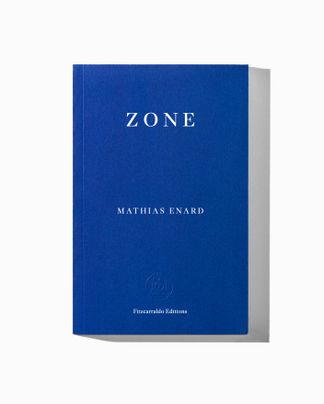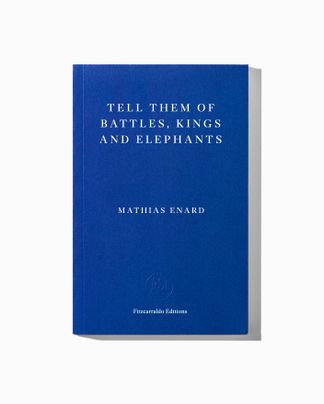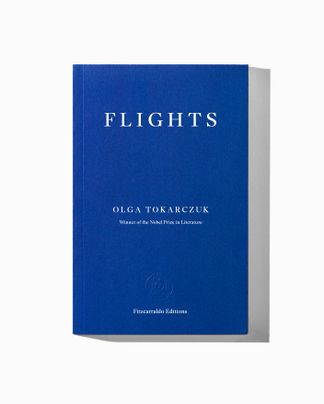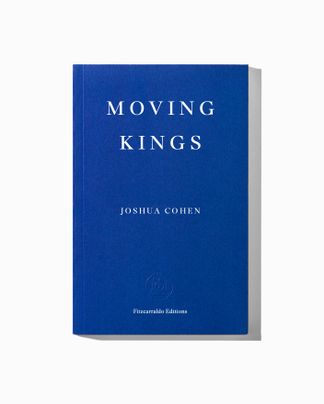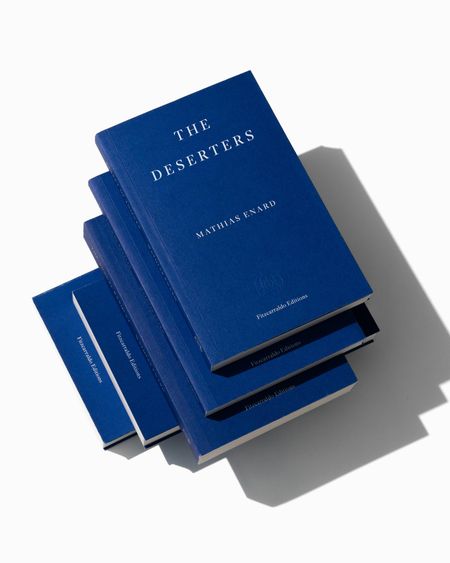As night falls over Vienna, Franz Ritter, an insomniac musicologist, takes to his sickbed with an unspecified illness and spends a restless night drifting between dreams and memories, revisiting the important chapters of his life: his ongoing fascination with the Middle East and his numerous travels to Istanbul, Aleppo, Damascus, and Tehran, as well as the various writers, artists, musicians, academics, orientalists, and explorers who populate this vast dreamscape. At the centre of these memories is his elusive, unrequited love, Sarah, a fiercely intelligent French scholar caught in the intricate tension between Europe and the Middle East. An immersive, nocturnal, musical novel, full of generous erudition and bittersweet humour, Compass is a journey and a declaration of admiration, a quest for the otherness inside us all and a hand reaching out – like a bridge between West and East, yesterday and tomorrow. Winner of the 2015 Prix Goncourt, this is Mathias Enard’s most ambitious novel since Zone.
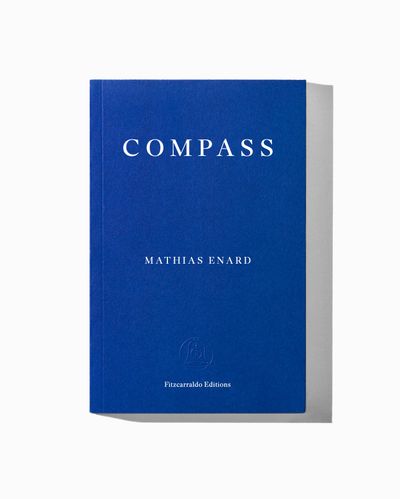
Compass
Translated by Charlotte Mandell
Published 22 March 2017, French paperback with flaps, 480 pages
Shortlisted for the 2017 Man Booker International Prize
Compass
Translated by Charlotte Mandell
(…)
It was raining over Hasköy, one of those Istanbul rains that swirl around in the wind and, even though it’s just a fine mist, can soak you to the bone in a second at a street corner; I carefully sheltered my camera in my raincoat, I had two rolls of 36-exposure colour film, ASA 400, a real archaeology these words are today – are the negatives still somewhere in my box of photos, it’s highly likely. I also had a map of the city, which I knew from experience was very incomplete when it came to street names, and an entirely Viennese umbrella with a wooden handle. Getting as far as Hasköy was quite something: you had to go around by the north via Shishli, or else follow the Golden Horn through Kasimpasha, a forty-five-minute walk from Cihangir over the hills of Beyoglu. I cursed Sarah when a car spattered the bottom of my trousers with mud as it rushed past me, and almost postponed indefinitely this expedition that was starting out in the most inauspicious way, already covered in filth, raincoat spotted, feet soaking, just ten minutes after emerging from the house where Faugier, observing the clouds darkening the Bosphorus, hung-over from his raki from the night before, tea in hand, had kindly warned me: it’s not a fit day to put an Orientalist out of doors. I decided to take a taxi, which I had wanted to avoid, obviously not out of stinginess, but simply because I didn’t know how to explain to the driver where I was going: I settled for Hasköy eskelesi, lütfen, and after a good half-hour of traffic jams I found myself by the water, on the Golden Horn, in front of a little, entirely charming harbour; behind me, one of those very steep colourful hills so peculiar to Istanbul, a precipitous street whose asphalt was covered in a fine layer of rain, a transparent stream that gently trickled down the slope to join the sea – this strange aquatic ascension reminded me of our amusements by the mountain waterfalls in Austria; I would leap from one side of the lane to the other according to the whims of this urban river, not too sure where to go; the inconvenience of having wet shoes was largely compensated for by the pleasure of the game. I imagine the passers-by must have thought that a mad tourist afflicted with hydrophilia was mistaking himself for a trout in their neighbourhood. After a few hundred metres and a fruitless attempt to unfold my map under my umbrella, a man of a certain age with a short white beard came up to me, looked me up and down from head to toe and asked, in English:
‘Are you a Jew?’
Since obviously I didn’t understand, I replied What? or How’s that again?, before he explained his question, smiling:
‘I can do a good Jewish tour for you.’
I had been approached by a prophet who had just saved me from the flood – Ilya Virano was one of the pillars of the Jewish community in Hasköy, he had seen me lost and had guessed (as he himself acknowledged, the neighbourhood wasn’t exactly overflowing with tourists) that I was probably looking for something that had to do with the Jewish history of the neighbourhood, through which he guided us, my camera and me, for the rest of the day. Mr Virano spoke perfect French, which he had learned at a bilingual school in Istanbul; his native language was Ladino, whose history he explained to me: the Jews who had been chased out of Spain and had settled in the Empire had brought their language with them, and this Renaissance Spanish had evolved with them in their exile. The Jews of Istanbul were either Byzantine or Sephardic or Ashkenazic or Karaite, by their order of arrival in the capital (the mysterious Karaites were more or less the last to arrive, most of them having moved there after the Crimean War), and it was absolutely miraculous to hear Ilya Virano recount the high points of this multiculturalism, through the buildings in the district: the Karaite synagogue was the most impressive, almost fortified, surrounded by high walls enclosing little wood-and-stone houses, some of which were inhabited, and others threatened with ruin – my naivety made Ilya Virano smile when I asked him if their occupants were still Karaite: it’s been a long time since there were any Karaites here.
Most of the Jewish families of Istanbul have moved elsewhere, to more modern neighbourhoods – Shishli or the other side of the Bosphorus – or else emigrated to Israel or the United States. Ilya Virano explained all that without any nostalgia, very simply, in the same way he initiated me into the theological and ritual differences between the many branches of Judaism during our tour, walking alertly through the steep streets, almost respectful of my ignorance; he asked the family name of this ancestor I was trying to trace: it’s too bad you don’t know, he said, there could still be some cousins here.
Mr Virano must have been around sixty-five; he was tall, quite elegant, with an athletic build; his suit, short beard and slicked-back hair gave him the look of a young film star on his way to pick up a girl at her parents’ to take her to the school dance, in a slightly greyer version of course. He talked a lot, happy that I understood French: most tourists on the Jewish Tours are Americans or Israelis, and he had little opportunity, he said, to practise this beautiful language.
The old temple of the Jews expelled from Majorca, the Mayor Synagogue, was occupied by a little workshop for mechanical things; it had preserved its wooden dome, columns and Hebrew inscriptions; its outbuildings served as warehouses.
I had come to the end of my first roll of film, and we hadn’t yet reached the old lycée of the Alliance Israélite Universelle; it had stopped raining and, unlike my host, I felt an onset of slight melancholy, an inexplicable, vague sadness – all these sites were closed and looked abandoned; the sole synagogue still functioning, with its Byzantine marble pillars along the façade, was used only for special occasions; a quarter of the big cemetery had been removed by the construction of a motorway and had been taken over by weeds. The only mausoleum of importance, belonging to a great family, Virano explained – such a great family that it owned a palace on the Golden Horn, where some military institution is now housed – looked like an old Roman temple, a forgotten place of prayer, whose sole colours were the red and blue graffiti written on it; a temple of the dead that overlooked the hill where we had a bird’s-eye view of the end of the Golden Horn, when it stops being an estuary and becomes again a simple river, in the midst of cars, factory chimneys and large blocks of buildings. The gravestones looked as if they were thrown here and there down the slope (laid flat, as custom dictates, my guide explained), sometimes broken, often illegible – he deciphered the family names for me, though: Hebrew resists the passage of time better than Latin characters, he said, and I had trouble understanding this theory, but the fact is that he managed to pronounce the names of these dead and sometimes find their descendants or relatives, without any apparent emotion; he climbed up here often, he said; ever since the highway was built there are no more goats, no more goats so fewer goat droppings but grass galore, he said. Hands in my pockets, strolling between the graves, I searched for something to say; there was graffiti here and there, I said anti-Semitism? He replied no, love, what do you mean, love, yes, a boy who wrote the name of his beloved, To Hülya forever, or something along those lines, and I realized that there was nothing here to desecrate that time and the city hadn’t already desecrated, and that no doubt soon the graves, their remains and their slabs would be moved and piled up elsewhere to give way to excavators; I thought of Sarah, I didn’t take any pictures of the cemetery, didn’t dare take out my camera, even if she had nothing to do with all this, even if no one had anything to do with this disaster that was all of ours, and I asked Ilya Virano to please show me where the Alliance Israélite school was, as a fine sun was beginning to shine on the waters of the promenade called the Eaux-Douces d’Europe and illuminate Istanbul all the way to the Bosphorus.
The lycée’s neoclassical façade was dark grey, punctuated by white pilasters; there was no inscription on the triangular pediment. It stopped being a school a long time ago, Ilya Virano explained; today it’s a retirement home – I conscientiously photographed the entrance and the courtyard; a few very old pensioners were taking the air on a bench under a covered porch; I thought, as Mr Virano went to greet them, that they must have begun their lives within these walls, that they had studied Hebrew, Turkish, French here, that they had played on this patio, had loved here, copied poems and argued over insurmountable trifles, and that now, the circle closed, in the same slightly austere building with the immaculate tiled floor, they were gently ending their days, looking out of the windows, from the top of their hill, watching Istanbul advance with great strides into modernity.
(…)
‘Crisply translated by Charlotte Mandell (as was Zone), Compass is Proustian in its set-up…. [T]here are passages of pure delight with rare insight into the human condition.’
— Tobias Grey, Financial Times
‘Few works of contemporary fiction will yield as much pleasure as Compass. Reading it amounts to wandering into a library arranged in the form of an exotic sweet shop, full of tempting fragments of stories guaranteed leaving you wanting more.’
— Eileen Battersby, Irish Times
‘Compass is a challenging, brilliant, and – God help me – important a novel as is likely to be published this year.’
— Justin Taylor, Los Angeles Times
‘One of the finest European novels in recent memory.’
— Adrian Nathan West, Literary Review
‘The French novelist Mathias Enard is an unusual kind of regionalist. His great subject isn’t a small town or neighborhood but the vast Mediterranean basin, and practically everyone within it. Enard speaks Persian and Arabic, and he has taught at universities throughout Europe and the Middle East. He sees the Mediterranean as a distinct literary and historical region, a “zone,” as he called it in his novel of the same title. In nine books, three of which have been translated into English, he has charted a course through this zone, writing about sectarian violence in the Balkans; the varying tugs of jihadism, tradition, and globalization in Morocco; and a rogue’s gallery of thieves, killers, and eccentrics. Enard’s prose, which tends to pile descriptive clauses ever higher on top of one another (Zone is a single, five-hundred-page sentence), can be mesmerizing. But it’s the larger project of his writing that bears particular consideration: in his fiction, Enard is constructing an intricate, history-rich vision of a persistently misunderstood part of the world.’
— Jacob Silverman, New Yorker
‘Enard is like the anti-Houellebecq, and he deserves far more attention.’
— Sam Sacks, Wall Street Journal
‘[T]he beauty of Compass is the sheer breadth and density of its vision, calling forth a multitude of different worlds, bound only by the capacious mind of its narrator, an aging Austrian musicologist named Franz Ritter.’
— Jeffrey Zuckerman, New Republic
‘Enard has written a masterful novel that speaks to our current, confused moment in history by highlighting the manifold, vital contributions of Islamic and other Middle Eastern cultures to the European canon. More than that, it points toward, as one character puts it, “a new vision that includes the other in the self.”’
— Andrew Ervin, Washington Post
‘[A] love letter to the cosmopolitan Middle East … [a] strangely powerful work.’
— Steven Poole, Guardian
‘In Charlotte Mandell’s elegant translation, Mathias Enard’s humane and erudite novel reminds the anglophone world of what it owes to Islam.’
— Ruth Scurr, Spectator
‘In a novel as full of erudition and historical knowledge as Compass, what we find at its core is a story that revolves around ‘that aporia, between self and the other, which is identity.’ Franz loves Sarah, with a desperation that is only felt more keenly with the hindsight of time and the presence of his unnamed and grave illness. Their story is deftly and recognisably told, moving with the slow pacing of fine storytelling and even managing to incorporate a very realistic use of the Internet.’
— John Holten, Stinging Fly
‘In a world that has become afraid of intelligence, Compass – slowly, I imagine, and carefully translated by Charlotte Mandell – is a deeply intelligent novel, a book that I could vanish into forever.’
— Anthony Brown, Time’s Flow Stemmed
‘A novelist like Enard feels particularly necessary right now, though to say this may actually be to undersell his work. He is not a polemicist but an artist, one whose novels will always have something to say to us.’
— Christopher Beha, Harper’s Magazine
‘Lyrical and intellectually rich without ever being ponderous, reminiscent at turns of Mann’s Death in Venice and Bowles’ Sheltering Sky.’
— Kirkus (starred review)
‘Compass is a book about boundaries and non-boundaries, smudged lines between countries, languages, cultures and times. Following this multi-directional flow is a pleasure, thanks in part to prose that – translated by Charlotte Mandell – buoys academic detours with aphorisms and scenes plush with emotional detail…. It is a book with ideas, but one that underpins its eruditeness with a sad, lovesick soul. For a novel overspilling with dead writers, Enard has created a story full of life, full of possibility for the oriental and occidental to find the self in the other.’
— Thomas McMullan, minor literature[s]
‘Upon reading it for the second time … I had the unshakable feeling that this book represented, not just a high-water mark for books in translation for 2017, but a landmark for the times through which we are passing.’
— World Literature Today
‘[T]he poignant prose manages to convey the heightened sense of feelings and sets the scene with confidence, transporting the reader with the atmosphere of the various locations, whether it’s within the heart of Paris or the Middle East. Overall this is a clever and ambitious piece of work about the interactions between the Western and Islamic worlds.’
— Buzz Magazine
—
Five Books interview Mathias Enard
—
Mathias Enard, born in 1972, studied Persian and Arabic and spent long periods in the Middle East. He won several awards for Zone, including the Prix du Livre Inter and the Prix Décembre, and won the Liste Goncourt/Le Choix de l’Orient, the Prix littéraire de la Porte Dorée and the Prix du Roman-News for Street of Thieves. He won the 2015 Prix Goncourt, the 2017 Leipziger Book Award for European Understanding, the Premio Gregor von Rezzori and was shortlisted for the 2017 International Booker Prize for Compass.
Charlotte Mandell has translated over fifty books of fiction, poetry and philosophy from French, including works by Marcel Proust, Maurice Blanchot, Abdelwahab Meddeb and Jean-Luc Nancy. Her translation of Compass by Mathias Enard was shortlisted for the International Booker Prize and was the recipient of the 2018 ALTA National Translation Award in Prose. She was recently named a Chevalier de l’Ordre des Arts et des Lettres by the French government and has received the Thornton Wilder Translation Prize from the American Academy of Arts and Letters.

